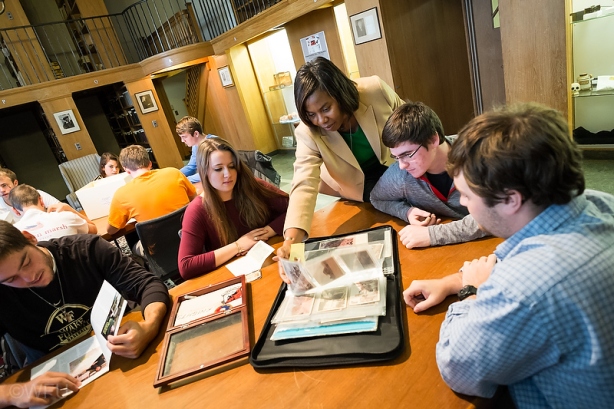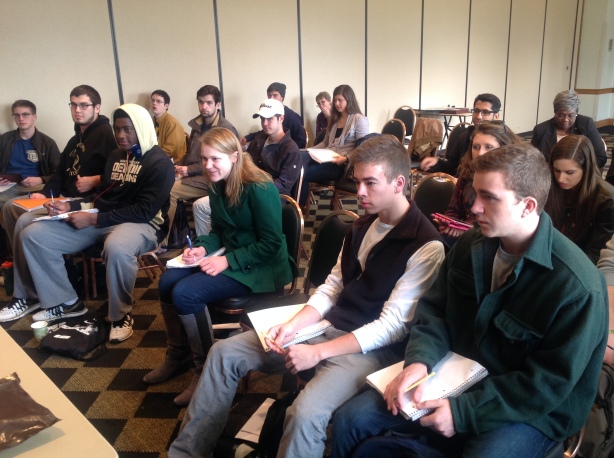When Writing Goes to War
Click image to view video:
Blogs written by students at Wake Forest University
Read more: WFU News: When Writing Goes to War
Blog #1: In Writing 111: When Writing Goes to War one of the more significant projects we did over the course of the semester was write letters home to anyone of our choosing. Some people decided to write letters home to their friends, while others chose family members like mothers, fathers, sisters and brothers. The letter was supposed to be a standard letter checking up on the recipient and also seeing how they were doing. As expected most of the recipients of the letters were shocked and not expecting them because letters for the most part in our common era are out of date, and other modes of communication like email, text, and phone calls are much more standard. The range of emotions the writers received from the recipients was very wide and different, some writers had their recipients reply very emotionally and even cry when they received their letters. Another reason that this project was done was to demonstrate how soldiers had to deal with communicating during the war. Although we know that soldiers write letters, we never actually take into consideration how much time they spend on their letter or what it would be like to write letters of our own. As a result, we were somewhat put in the same situation as soldiers were having to write letters to our family. I think that the experience was a valuable one and we learned from it in some way or another. I think some people realized the difficulty of communication in the past, while others realized they were grateful for the communication we have today. Furthermore, I think it taught people the significance and symbolism of letters and how they are more than just a form of communication and they symbolize effort and work and people are much more appreciative to receive a letter than a text or an email.
Read more: Vietnam Vets discuss post-war struggles
Blog #2: I knew it was on the sixth floor of the library, however, I didn’t know where exactly. I got off the elevator and, of course, turned right to see if it was down the hall. I say of course because it was on the left side of the library. I walked towards 625, the special collections room, and saw a few familiar faces. After we all got situated, we were told about what special collections was and why it was important to Wake Forest. Special collections contains literature dating from the 16th century to the present. It is a room with about two levels containing works from important authors to letters from soldiers. Our visit was concerned with the letters form the soldiers from World War II, World War I, and the Civil War. In particular with these wars, we read letters from four soldiers. The class as a whole was very intrigued because we were all amazed about the fact that these were the actual letters from the soldiers.
In our hands we held paper from the 1800s that contained personal accounts of the Civil War. We all did our bests to decipher the letters, but as you can imagine they were fairly difficult to read. We used magnifying glasses to better read the letters, especially the ones form the Civil War. Most of the soldiers had written in cursive and some of the words were illegible. I can imagine that in times of war it is hard to write carefully, let alone find a good surface to write on. I had a difficult time fathoming the fact that these were letters from the wars many years ago. I love history and standing in places where it was made, and to me this was reading and visualizing history in the making. The letters made the wars seem less like story from the past and more like something very real. The wars were viewed less as things that we have seen in movies and our history books, but seen as something that was more of scary. We were all about the same age as these soldiers and it was a fearful thought that we could be in the same situation as them. The trip to special collections taught us all that war is all too real.
Blog #3: Every day of class another reading was due, a new soldier, a new experience. We got something more than just a reading we had veterans share their experience with us. They came from all over the state to answer any questions that we had about the war and to explain anything that we felt was important. We walk in the day of this event with snacks laid out for the vets, photos on the side, and a table set up for the men to sit. It was almost like a press conference, the men sat in the front and were relayed questions from the curious students that just wanted to know what they did with their time. The veterans shared a variety of their experiences including how they were able to deal with relationships during their service,what the conditions for them at war were like, and what positions they took as members of the army. In addition, the veterans brought a variety of different mementos from the war they had and received including meals they were given, awards of honor, and other necessities they used in order to survive and live a healthy lifestyle abroad. Veterans also laid out scrapbooks of pictures and memories that they had from their war experiences. The students got their questions answered and at the end of the event were able to give these veterans letters they had written early in the week to show appreciation for their service and to ask them any last questions before the event was over. From the experience the students were able to gain a lot and learn a lot from the veterans.
A question was asked to the group of veterans and they would go through individually and answer the question based off of their own experiences and knowledge they had gained from their time spent away fighting for our country.
Over the course of the semester, the students had several other guest speakers as well. Some of the guest speakers included Professor Ali Sakkai, who was an immigrant born and raised in Kuwait, Professor Raynor’s brother-in-law who served in the current war we are fighting with Iraq, as well as several others who have given us good insight on what it is like to be a soldier, how they have dealt with their experiences and also what their experiences have been like. Overall I think the veterans and their discussions have been one of the most important and meaningful experiences we have had over the course of the semester. Hearing firsthand from veterans was helpful in helping us all understand what it was actually like for them and hearing it from them rather than reading it in a novel was just further clarification.
Read more about the class:





